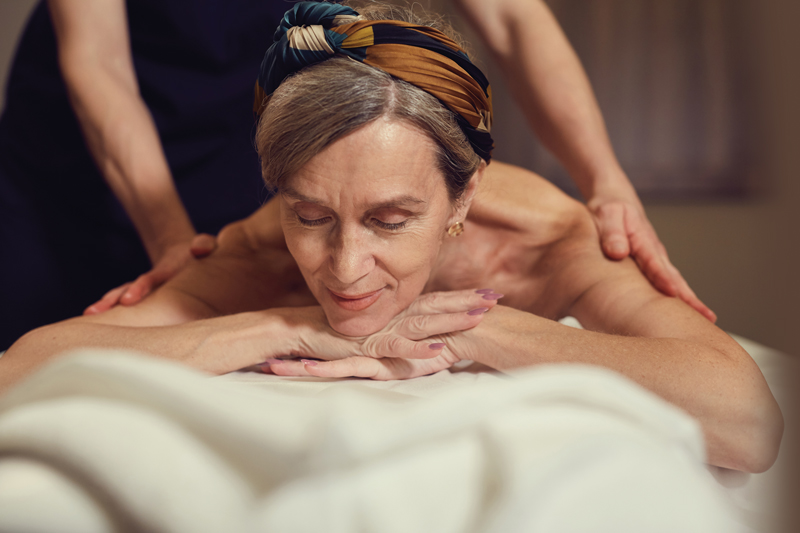For most of us, aging is not something we look forward to; the impact it has on our physical (and mental) health is dramatic. As kids, all we want to do is grow up. Our bodies rebound quickly when injured. Our skin is fresh and new. Then, during our magical 30s and 40s, wrinkles start to pop up and we begin to see our first white hairs. Some of the more dreaded aspects of aging come when our 50s and 60s hit and we start losing muscle tone, our skin becomes thinner, and the list of medications to deal with our ailments rises. Even our sleep is affected—we have neither the same quality nor quantity of sleep as we did when we were younger. And over the next few years many of us become less mobile—we are often alone and sometimes need a caregiver to help with our daily activities. During this time, we start to lose one of the most crucial and therapeutic ways of dealing with aging: the power of touch.
The Need for Human Contact
Years ago, I worked briefly in a facility helping people who were interested in making the transition to assisted living. It was shocking to see so many people navigating this transition on their own and just how lonely many of them were. Many residents had very few—if any—visitors. It was heartbreaking to see how many of these wonderful people did not have any positive touch outside of someone helping them to get dressed or brush their hair. One of the often-unspoken aspects of aging is loneliness and depression. As kids, when we were hurt, we would run to our parents for a hug and felt safest there. As aging adults, however, we don’t always have a safe place to go for that comforting touch. Many older adults lose their life partner; they are suddenly sleeping alone and no longer have that constant hand to hold. As we become isolated due to age, it heightens that sense of loneliness—loss of that physical touch has a tremendous impact.
The Power of Massage
Massage is one of the most powerful tools we have at our disposal to help us navigate the impacts of aging. Massage with the elderly is a different style of massage—it tends to be much lighter and gentler and increases blood flow, which helps with circulation. When we start to lose circulation and our muscles are tight, we tend to fall more often and get more injuries. Massage not only helps increase circulation but helps loosen tight muscles and create more stability and balance as well. Massage can significantly aid in preventing falls just by helping us take care of our bodies and move better. The onset of arthritis may be another difficult aspect of aging, and massage has benefits there as well—through gentle manipulation and stretching of our muscles, joints, and soft tissue, massage can help reduce inflammation and even help provide greater range of motion.
Massage sessions with the elderly are typically shorter sessions, generally lasting thirty minutes and often performed while the client is in a wheelchair, chair, or bed. Sessions are a safe place where there is no judgment and a licensed massage therapist can spend time working on relaxation, range of motion, and pain management and help circulation, stimulate the lymphatic system, and even help the client to sleep better. While those are all wonderful effects, for me nothing is better than the smile we see at the end of a session knowing that for a moment, you made someone’s life better and offered some relief. They felt cared for as a person and had their needs attended to.
Let Us Help You
At Cortiva Institute, we have a group of very loyal clients come in for massages with our students, a good portion of whom are seniors who come every week. They tell us that coming to the institute is the best part of their week, when they can just relax and come out feeling better than when they came in. It is not uncommon to hear that our clients consider us family because of the care we offer. Our students take a special group of classes called Special Populations in which they are trained how to properly massage someone who is elderly, as there are precautions that need to be taken and contraindications that need to be considered to keep their client safe. All our clients are special to us, but those who have lived full lives and need some extra TLC can be some of our favorites. It is a privilege to be able to help and give back. During the days of COVID, as we are told not to touch and to stay away, to be able to provide some relief and touch therapy in a safe and caring manner is one of our greatest joys.
Elisabeth Johnson is the Campus Director of Cortiva Institute in Cromwell, CT. Cortiva offers a robust Massage Therapy and Esthetics program as well as CEU courses for advanced training. She can be reached at 860.667.1886 or at: elisabethj@cortiva.edu. Elisabeth resides in the Stony Creek section of Branford with her boyfriend Chris and his three kids—Chloe, Katie, and Max, and their dog, Juniper.
